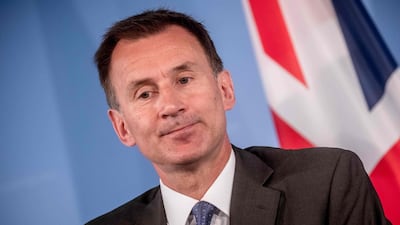Former UK health secretary Jeremy Hunt said failures while he was in office may have hampered Britain's Covid-19 pandemic response.
Mr Hunt, who led the Department of Health from 2012 to 2018, said he regretted not recruiting more frontline nurses and doctors during his time in charge of England’s National Health Service.
Speaking to the British Medical Journal, Mr Hunt said the staffing system needs urgent reform as he called on the government to publish figures on exact requirements each year.
"If you don't plan for the NHS workforce strategically, it ends up costing the taxpayer much more because the NHS then ends up recruiting locum doctors and agency nurses who are much more expensive," he told the BMJ.
Previous analysis by the Unison trade union showed there were 106,000 vacancies across NHS England, including over 44,000 vacancies in nursing. Labour’s Shadow health minster Jon Ashworth described the figures as “shocking” when they were released in December 2019, just as the coronavirus pandemic was taking hold in China.
An OECD report in 2019, found that the UK had just 2.8 doctors and 7.8 nurses per 1,000 people. The average across the OECD's 36 member countries was 3.5 doctors and 8.8 nurses.
Mr Hunt said the UK failed to learn the lessons from previous disease outbreaks in Asia, such as SARS and MERS, and should have focused on 'test and trace' earlier in the pandemic.
"We've really been on the back foot from the start on test and trace, and in some ways it dates back to the period when I was health secretary," he said. "It's why there is this stark difference in the effectiveness of our responses compared with countries in East Asia."
However, Mr Hunt said he believes the biggest mistakes made during the pandemic were related to the discharging of Covid patients into care homes.

According to the BMJ, Hunt supported calls for a public inquiry into the UK's handling of the pandemic, but not in the immediate future.
However, the implementation and such as vaccine development and distribution should also be examined by any future inquiry, he says.
"We have had probably the most effective vaccination programme anywhere in the world, in terms of the speed of approving and distributing vaccines [in the UK], but also ... this is the country that developed one of the vaccines that has been approved for use," he says. "The UK has punched well above its weight in terms of helping the world find a solution to this terrible nightmare."


